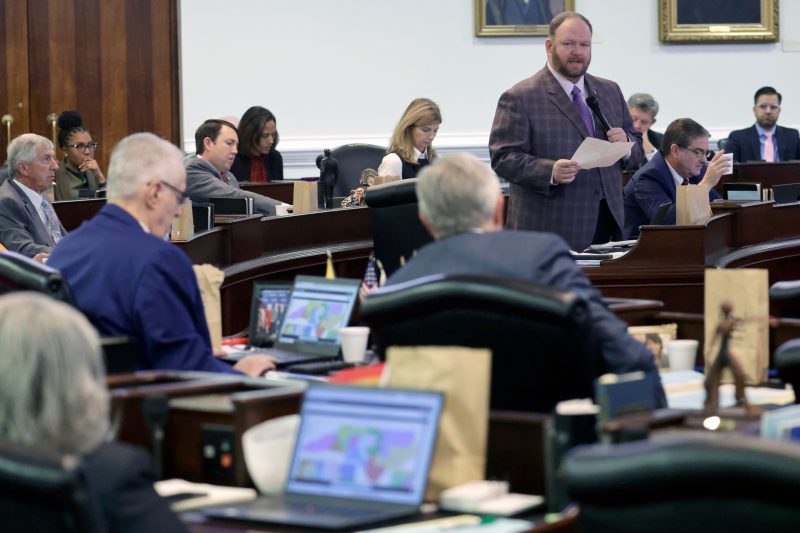N.C. Republicans pass redistricting map expected to flip 3 House seats

In a move that could solidify GOP power in the state for years to come, North Carolina Republicans passed new congressional and state legislative maps Wednesday that could flip three or four U.S. House seats while easing a path for the party to hold onto veto-proof majorities over state legislation.
Critics of the map say it weakens democracy by limiting the power of Black and Brown voters and crafting districts into GOP strongholds that curb Democratic voters’ influence.
“North Carolina is now one the most egregiously gerrymandered states in the country,” said Eric Holder, the former U.S. attorney general and current head of the National Democratic Redistricting Committee.
Proponents say they are allowed to draw maps that favor political parties because of recent court precedent, and that Republicans have the power to do so because they won more seats in both chambers.
“The chickens are coming home to roost for the Democrats,” said Paul Shumaker, a senior Republican consultant in North Carolina. “Elections have consequences.”
The Republican redistricting of North Carolina is the party’s latest attempt to redefine congressional voting districts nationwide as cases across the South, including in Alabama and South Carolina, face legal challenges.
The newly-enacted districts come almost a year after the state Supreme Court flipped from Democratic to Republican control in the 2022 elections, and GOP justices ruled in April that redistricting for partisan gain was constitutional under state law. That decision reversed a ruling a year earlier from the state’s highest court that threw out proposed boundaries because of what it saw as illegal partisan gerrymandering.
The map creates 10 likely Republican districts, three likely Democratic districts and one that appears to be competitive, according to statewide election data.
North Carolina’s 14 congressional seats are evenly split between Democrats and Republicans after a temporary map was created following the top court’s decision to throw out a Republican-proposed map. The new map would probably flip at least three of those seats to the GOP, which could also help give them control in a U.S. House where Republicans hold a narrow 221-212 majority.
The three- or four-seat swing is significant even for partisan gerrymanders, experts say, showing how court elections can significantly alter the direction of a state and, potentially, control of the U.S. House.
In an analysis of recent elections in North Carolina, Duke University mathematics professor Jonathan Mattingly, who studies the effects of gerrymandering, found that electoral outcomes under the Republican maps wouldn’t reflect voters’ changing preferences, even when Democrats overperform.
“If the opinion of the people changes sufficiently, who is elected should change,” Mattingly said. “These maps are nonresponsive. With them, the elections have no consequences. That’s not really democracy.”
Andrew Taylor, a N.C. State University political science professor and the director of the Free and Open Societies Project, said the North Carolina legislature has some of the most leeway of any in the country to enact new voting districts, though it is subject to existing federal law. Taylor, who has previously served as an expert witness for Republicans, said he expects legal challenges to follow the bill’s passage.
Experts across North Carolina agree that legal challenges will be forthcoming, alleging that the redistricted maps are racially gerrymandered and unlawful under the Voting Rights Act because they don’t allow Black voters to fairly elect their representatives.
Morgan Jackson, a Democratic strategist in the state, said he think there’s likely a viable path to challenge the new map on the grounds that it dilutes the Black vote after the U.S. Supreme Court ruled Alabama’s new congressional map was unconstitutional for that reason. That’s in addition to the aggressive gerrymander he says will limit Democratic voters’ influence statewide.
“They’ve taken essentially a 50-50 state and drawn a map where 80 percent of voters will have a Republican member of Congress,” said Jackson, the Democratic Party strategist.
Some advocates and organizations in North Carolina have started analyzing the maps for possible pathways to file lawsuits.
That includes Hilary Klein from Southern Coalition for Social Justice, who wrote in a letter to state GOP leaders that the state Senate legislative districts effectively dilute the Black vote in at least two seats.
“It is clear as day,” Klein said. “Anybody who knows anything about North Carolina knows the Senate map is going to deprive North Carolina’s Black Belt of any representation.”
Mattingly’s analysis also found that the maps probably will help Republicans hold onto majorities — and potentially veto-proof majorities — in both chambers.
The redistricting is also likely to help Republicans’ attempts to keep the seat of Rep. Tricia Cotham, who switched from the Democratic Party to the Republican Party in April, giving the GOP a razor-thin supermajority.
Republicans have defended their maps, arguing that they reversed Democratic judicial overreach and that Democrats would similarly redraw maps to favor their side. They also argued that drawing maps favoring a political party is legal, according to the state’s highest court.
During debate on the maps, they instead argued that Democrats must try to appeal to rural voters.
“We have complied with the law in every way on these maps,” Republican state Rep. Destin Hall said. “Our overarching goal in the creation of this House plan was to create Republican-leaning districts where possible.”
In the U.S. House, the plan could squeeze out Democratic Reps. Jeff Jackson, Wiley Nickel and Kathy E. Manning, while freshman Rep. Don Davis would run in the one competitive district. Davis is one of three Black Democrats from the state in the House.
“Once again, this General Assembly has enacted maps that racially gerrymander North Carolinians in an effort to ensure a predetermined outcome: large majorities for Republicans in both chambers and an outsize share of the Congressional delegation in a purple state,” said state House Minority Leader Robert Reives in a statement
Gov. Roy Cooper (D) has also come out against the proposals, though the redistricting is not subject to his veto.
“They have used race and political party to create districts that are historically discriminatory and unfair,” Cooper said in a statement. North Carolina is just over a fifth Black, according to U.S. Census data.
Republican lawmakers said they did not use racial demographic data to create the districts.
How the Republican lawmakers created the maps, though, is unclear.
Because of a recently passed budget resolution, communications about the redistricting process among state lawmakers are not subject to freedom of information requests, making it more difficult for the public to know what was considered with the maps. Legislators can destroy their communications concerning the map’s design when they see fit.
Top Republican lawmakers and aides involved in the process did not immediately respond to a request for comment Wednesday.
In 2022, when the state Supreme Court threw out Republicans’ proposed map, those communications proved relevant in the legal challenges to showing that, according to the court, the new borders were illegal partisan gerrymanders.
U.S. Rep. Deborah K. Ross (D-N.C.) said Republicans made the change so they could legislate in a “much more secretive way.”
“This is not only a power grab, but it’s a power grab under the cover of darkness,” Ross told The Post.
The change is one of many the Republicans have instituted since taking a veto-proof majority. The legislature has also faced lawsuits over voting laws and election boards.




